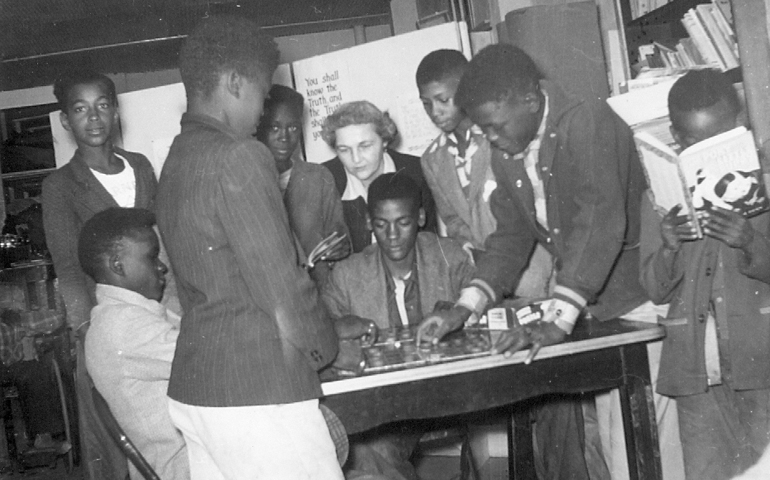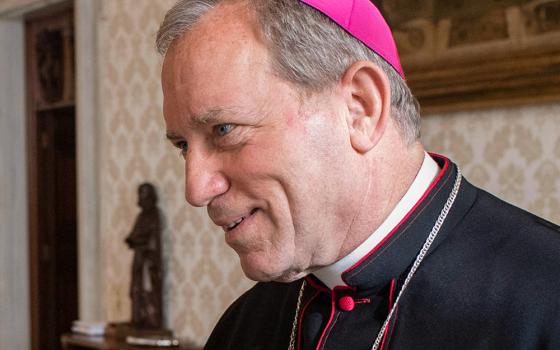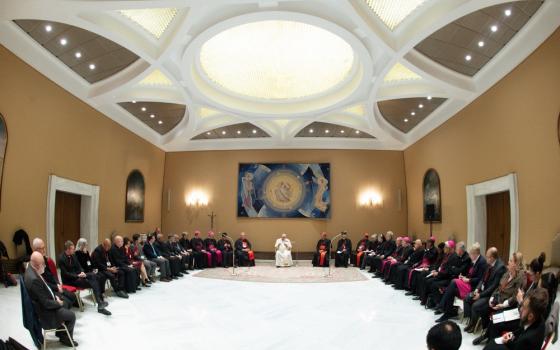
Members of Pax Christi and young men are pictured in this 1952 photo inside the St. Francis Information Center in Greenwood, Miss. The Catholic organization was a key player in the civil rights movement. (CNS/Courtesy diocese of Jackson archives/Bishop Oliver Gerow)
Pax Christi International was born 70 years ago of two people, one a bishop, the other a laywoman, who advanced ideas that were jarringly dissonant in the context of that time.
The bishop, Pierre-Marie Théas, of Montauban in the south of France, was a rare member of the hierarchy to both publicly protest the deportation of Jews from France and urge prayers for the enemy, Germany. Marthe Dortel-Claudot, who lived in the south of France with her husband and children, found herself thinking about praying for the enemy. Pondering the suffering of the German people, she wrote in her journal, "Jesus died for everyone. Nobody should be excluded from one's prayer."
The two, sharing a vision of reconciliation, went on to form the organization Pax Christi. Germany and France live in peace today; Europe has achieved union and nonviolent means of settling differences. Pax Christi, however, has not gone out of business. The purveyors of violence are endlessly inventive. From child soldiers to the utter detachment of drones, from crude IEDs to sophisticated bombs, from oil wars to the formation of caliphates, those who use violent means no longer observe rules or boundaries.
Perhaps the reality that most solidly links the decades of Pax Christi's existence is the understanding that confronting violence is a complex and difficult undertaking and involves advancing ideas that are at odds with the prevailing thinking of the day.
Pax Christi has grown increasingly global in its reach, and that is reflected in its three principal leaders: co-presidents Marie Dennis, a laywoman from Washington, D.C., and Bishop Kevin Dowling of Rustenburg, South Africa; and General Secretary José Henríquez, a native of El Salvador who now lives in Brussels, where Pax Christi is headquartered. The co-president arrangement, reflective of the founders, was instituted in 2007.
The three current leaders of Pax Christi recently were in the Washington area for a fundraising event and to observe the organization's 70th anniversary. In a Sept. 23 interview with NCR, they spoke of a self-evaluation the organization had undertaken and of the daunting challenges today's peacemakers face.
Pax Christi consists of more than 100 member organizations around the world. The presumptions that the founders could engage in predominantly Christian and Catholic France and Germany in the 1940s no longer exist in an increasingly plural world. Pax Christi grows out of Catholic experience and has a special relationship with the Pontifical Council for Justice and Peace, but, Henríquez explained, it is not a confessional organization. Faith may be an integral part of members' motivation and activity, but the organization does not require that members be Catholic. "In fact," he said, "we are trying to work more and more for peace on the interreligious level because of the importance that has in our world."
No single overriding issue occupies the entire organization. Groups might choose membership because of a particular issue, said Dennis, or groups and individuals might join in order to have access to resources, representation at international meetings, or to be in solidarity with others. Henríquez has connections to offices of the European Union through member organizations, and Dennis, through affiliations with groups like Maryknoll (where she previously served as director of global concerns) and other denominations, has access on Capitol Hill.
Dennis also participates in a working group that relates to the U.N. Security Council. The group meets about twice a month with one of the principal members of the Security Council, sometimes a permanent member, other times an elected member. Most often, she said, the meeting is with a country's ambassador, delegate and key staff. The off-the-record sessions, she said, provide "a great opportunity to ask questions, test hypotheses and to get ideas into the mix."
Such associations are in line with four areas of focus that grew out of a more than yearlong project, requested by the secretariat and board of Pax Christi, and carried out by the membership in answer to a fundamental question: What is Pax Christi International?
The areas agreed on were:
- Build the movement by supporting and encouraging the growth of the Pax Christi network in all directions.
- Develop "capacity," especially horizontally. Explained Dennis: "How do we help the Pax Christi International organization in Congo learn from the experience of another Pax Christi organization in Australia or Lebanon?"
- Develop a spirituality of nonviolence. "What is it that motivates a person or local community, often in the context of great violence, to work for peace nonviolently? Sometimes it's faith," said Dennis. "Sometimes it's not. So we encourage reflection on that; we bring it together, think about it, publish literature about it."
- International advocacy, which includes association at the U.N., lobbying governments and their agencies, and an ongoing effort to build Pax Christi teams around the globe.
In the day-to-day, Dennis said, "we try to bring the experience of Pax Christi members from wherever they are into the big policy debates." The result is "to try to articulate a way that reflects our commitment to nonviolence. We are not pacifists, not across the board. There are many pacifists within the Pax Christi family," she said, but the organization does not adhere to an absolute ban on all use of force.
Dennis, a graduate of Trinity Washington University and the mother of six grown children, said her sense of social justice was awakened initially by a parish workshop decades ago. The workshop "blew the top off our parish," she said. "I mean, literally, in one day, I walked out of that workshop and I was never the same again." She has been involved in justice work ever since.
Henríquez, a former Marist brother who earned a master's degree in international development from American University in Washington, has long experience in development work in Central America. He said his "personal search" involved "trying to put one foot on both sides" of the North-South divide to "understand how I can help build bridges in the quest for justice." His search, he said, "came from experiencing oppressive governments and oppressive structures -- governments killing their own people." He had worked with indigenous and other marginalized groups in Central America "trying to find a new way of being citizens and to foster dignity for every person."
Dowling was formed as a seminarian and later a priest in the tensions of apartheid South Africa. It was experiences in that era that set him on a path that would mark him as an outspoken advocate for marginalized populations.
The Vatican has always been supportive of Pax Christi's initiatives and Dowling said the organization keeps the Pontifical Council for Justice and Peace informed of its activities.
He and Dennis were invited to give an address as co-presidents at the Vatican's observance of the 50th anniversary of Pacem in Terris, Pope John XXIII's encyclical on peace. Dowling also has been invited to meetings in Africa organized by Cardinal Peter Turkson, president of the pontifical council, to discuss Pope Benedict XVI's encyclical Caritas in Veritate.
Dowling said he especially is pleased with the council's statements on the economy, which have been critical of unbridled capitalism. The material, Dowling said, "was really challenging and it's good research. It was controversial in some quarters, but it shows a thinking church, a church that's coming to grips with real questions."
In a world made complex by terrorists, nonstate militias and borderless wars, Dennis said Pax Christi is pushing the church "for a deeper reflection on nonviolence that helps us go beyond a very superficial understanding," something more "than what you do outside the White House when you cross the line." She said the organization is seeking an understanding of nonviolence that would incorporate a greater range of actions that the organization's members are doing every day, actions that are nonviolent and "all about building peace, not just opposing one thing or another."




